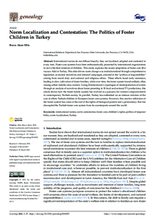Abstract: International norms do not diffuse linearly; they are localized, adapted and contested at every turn. Foster care systems have been enthusiastically promoted by international organizations to serve the best interests of children. This study explores the recent adaptation of foster care (Koruyucu Aile) in Turkey. This elite-driven norm change was institutionalized through comprehensive legislation, economic incentives and national campaigns, situated in the “politics of responsibility” arising from moral duty and national and religious ethics. These efforts faced early resistance, leading to slow cultivation of foster families, while over time, the foster system found unlikely allies among urban middle-class women. Using Zimmermann’s typologies of reinterpretation of norms through an analysis of narratives about foster parenting in 50 local and national TV productions, this article shows how the foster family system has evolved as a panacea for women’s empowerment in contemporary Turkish society. In parallel, Turkey has embarked on an intense criticism of the care of ethnic Turkish children in European foster care systems. However, this creative utilization of the foster system has come at the cost of the rights of biological parents and a permanency that has decoupled the Turkish foster care system from its counterparts around the world.

